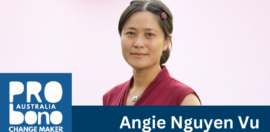Corporate Fundraising - with Media Organisations
10 December 2001 at 12:12 pm
With such an enormous emphasis these days on building corporate community relationships, vying for those big company sponsorships and stepping up to ask for business donations; there is one area of the corporate world which may seem elusive to many fundraisers – the media! Dealing with media organisations is often in the too hard basket for the smaller players. But Gayle Austen, the Corporate Affairs Manager with the Seven Network in Melbourne offers some tips and inside information that addresses many concerns of Not for Profit organisations. Perhaps the news won’t be good for many who have tried and failed to engage media outlets in their fundraising campaigns because they haven’t understood how the media operates. Gayle Austen, speaking at a recent FIA luncheon, says media companies are traditionally not strategic in their approach. They are, by nature, less interested in the word – “philanthropy”, particularly if the Prime Minister is encouraging them to do it! However, encouragingly, Austen says media companies are the most pragmatic ‘potential’ sponsors or donors that Not for Profits will ever approach. She says they have a lot to give and are prepared to give back to the community – but they also have their eye firmly on publicity for their people and product. If there is a possible spin-off in advertising dollars – for instance if a charity is backed by a major advertiser who will spend with the media organisation – that is a sure-fire winner. Austen points out that ‘strategy’ has not been a big part of the way media companies have traditionally handled requests for funding. Managers like Austen, who are charged with receiving, prioritising and delivering on sponsorships, are consequently a rare occurrence in media companies. Austen says media companies have traditionally not supplied huge amounts of cash. In addition, the contribution of column centimetres or airtime has often been ridiculously undervalued – both by the giver and the receiver. In television, for instance, the average Community Service Announcement costs $10,000 to make and gets $55,000 worth of airtime. A series of back-announcements to promote an event is worth about $30,000. Austen laments that the significance of these investments has often remained unacknowledged. She says another often-underestimated area is the capacity of media organisations to generate cash for charities and causes. One outstanding example of this for the Seven Network in Melbourne is the Royal Children’s Hospital Good Friday Appeal, where three media – television, radio and newspapers – combined last year to raise $7.5 million. The Appeal is backed by a non-stop telethon and radio-thon from early morning to midnight and receives much support from other media outlets that advertise the event even though they are not directly involved. Austen says that from the corporate giver’s point of view, a strategic approach, valuing the contribution appropriately, and adding value are all equally important elements. But she says it is this last area – where companies can take actions and provide resources of all kinds to assist a fund-raising organisation – which is the greatest break-through from the fund-raiser perspective. She says for media companies, which do not contribute a lot of cash, there has always been a strong element of adding value by providing in-program support – perhaps a mention on the News or an interview on a talk show – as well as MCs and personalities for events. As for disadvantages for the fund-raiser, Austen says television is tough and is also very much driven by the business case. From Gayle Austen’s decade of experience in corporate relations as well as many years as a journalist, she offers a number of tips to fundraisers for successful media relationships. ? Take a professional and business-like approach by providing plenty of documentation – take brochures, running sheets, newsletters into your meeting. ? Take a firm proposal. An organisation that can put forward some sort of proposal, maybe with a few options, is an organisation that can make the most of sponsorship. ? Take some information on the specifics of your organisation’s work. Explain what you do and tell the story of how and why your organisation started. ? Take a video if you have one, even if it’s an old one. ? Propose a visit, if appropriate, to better illustrate what you’re all about. ? Acknowledge the value of what you are asking for, or what is being offered to you. ? You must offer your potential sponsor or donor a real return on their investment such as good publicity for the company, good events, lots of ideas and enthusiasm and identify your key audience. ? Offer plenty of exclusive opportunities for hosting events, plus signage, logos and stories in newsletters and on web sites. As well, there are a few don’ts: ? Don’t approach an organisation with an expectation of philanthropy because you are seeking a deal not a donation. ? Don’t overstate the benefits you are providing. (As a television station, it is particularly galling to have a non-TV person telling them about the benefits they will receive from being involved in an event.) ? Don’t ask for the world. (They don’t have it to offer, and Austen says it can be very off-putting.) ? Don’t make the benefactor uncomfortable. Shock tactics, shame and pity really have no place in a partnership. Gayle Austen ended her speech by offering one important piece of advice – take no for an answer. Austen says fundraisers must be gracious if the answer is no and emphasised that ‘no’ today doesn’t necessarily mean ‘no’ next year, particularly in the television industry!








